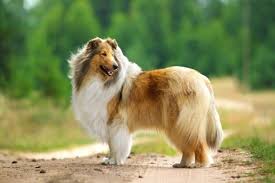
Rough Collie
Conditions of detention
Rough Collies adapt well to various living conditions, but they thrive in homes with yards where they can exercise and play. They are not ideal for apartment living unless they receive ample outdoor exercise.
Useful Fact: They enjoy spending time with their families and can suffer from separation anxiety if left alone for long periods.
Nutrition and diet
A balanced diet rich in protein is essential to support their active lifestyle and maintain their luxurious coat. High-quality commercial dog food or a well-planned homemade diet is recommended.
Useful Fact: Regularly providing omega-3 and omega-6 fatty acids can help maintain the health and shine of their coat.
Health
Rough Collies are generally healthy but can be prone to certain genetic conditions such as Collie Eye Anomaly (CEA), hip dysplasia, and Progressive Retinal Atrophy (PRA).
Useful Fact: Regular veterinary check-ups and genetic testing can help detect and manage these health issues early.
Grooming and care
Their long, dense coat requires regular grooming to prevent matting and tangling. Brushing several times a week and occasional professional grooming are recommended.
Useful Fact: Bathing should be done as needed, and special attention should be given to their undercoat during shedding seasons.
Education and training
Rough Collies are intelligent and eager to please, making them highly trainable. Early socialization and obedience training are crucial.
Useful Fact: Positive reinforcement techniques work best, as Rough Collies are sensitive and respond poorly to harsh training methods.
Toys and entertainment
Interactive toys, puzzle games, and activities that engage their minds and bodies are ideal. They enjoy tasks that mimic herding, such as fetching and agility courses.
Useful Fact: Regular mental stimulation and physical exercise are essential to prevent boredom and destructive behavior.
Safety
Given their herding instincts, Rough Collies should be supervised around small children and animals to ensure they do not attempt to herd them. Secure fencing is necessary to keep them safe.
Useful Fact: Leash training is important for their safety during walks, as they may have a strong desire to chase moving objects.
Accessories
Sturdy collars, leashes, and comfortable bedding are necessary. Given their coat, a good quality grooming kit is essential.
Useful Fact: A harness can provide better control during walks and help manage their pulling tendency when excited.
Socialization
Early and consistent socialization with other dogs, animals, and people is important to ensure they grow into well-rounded adults.
Useful Fact: Regular playdates and exposure to different environments can enhance their social skills and reduce anxiety.
Travel and Transportation
Rough Collies are generally good travelers. They need secure arrangements and ample breaks during long trips to stay comfortable.
Useful Fact: Training them to be comfortable in a car from a young age can make travel easier and less stressful.
Behavior and psychology
Rough Collies are known for their intelligence, loyalty, and gentle nature. They are affectionate with their families and often good with children and other pets.
Useful Fact: Understanding their need for mental and physical activity can help in managing their behavior and ensuring a happy, well-adjusted pet.
Legal aspects
Owning a Rough Collie may be subject to specific regulations, especially concerning their breeding and keeping in certain areas.
Useful Fact: Checking local regulations and breed-specific laws can help ensure compliance and prevent legal issues.


